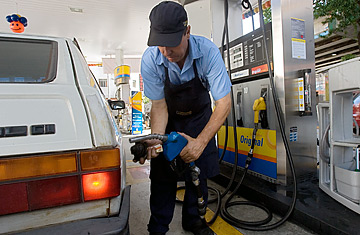
A gas station attendant fills a car with ethanol in Sao Paulo, Brazil, March 3, 2007.
The talks will be between two nations that are both partners and rivals on ethanol. Brazil and the United States together produce almost three-quarters of the world's ethanol, and with concern over CO2 emissions growing almost daily they are both keen to find a clean and efficient substitute for fossil-based fuels. But — no surprise — they don't agree on the best way to do it.
The U.S. makes its own ethanol from corn and it is reluctant to cede any more advantages to the Brazilians, who have decades of experience producing ethanol and whose sugar cane-based version is three times more efficient than the corn one. Brazil's ethanol is also around a third cheaper to produce. The U.S. levies a $0.54 cent per gallon tariff on Brazilian ethanol and does not give Brazil access to programs such as those Washington provides Caribbean and Central America, which grant nations from the region a special dispensation to export sugar-based ethanol to the U.S. Those exports provide 7% of all ethanol consumed annually in the U.S. American politicians, especially from corn-producing states, are fighting to maintain those barriers, and Bush Administration officials have said the President will not even discuss lowering tariffs in this week's talks with his Brazilian counterpart.
That doesn't make sense to Brazilians, and not only because prices of corn and corn-based foodstuffs are rising in the U.S. as producers devote more and more of their crop to fuel rather than food. President Luiz Inacio Lula da Silva pointed out that for a country eager to promote free trade such tariffs are a hypocritical barrier to the rapid development of alternative fuel sources. "The high tariff that the United States imposes on ethanol makes no sense," Lula said earlier this week, in a clear message to his visitor. "[The Americans] talk a lot about free trade but they like to protect their own products."
Brazilian producers will continue to push the U.S. for a tariff reduction, or at least some sort of favored nation status. But until they get a positive response, they will take their expertise elsewhere. With a solid background in ethanol production — Brazilian gasoline is 23% ethanol and two out of every three cars sold are Flex models that can run on either gas or ethanol — Brazil is in the driver's seat. Lula wants to export more ethanol to consumers and more expertise to governments — especially in Africa, Asia and Latin America — that want to start their own ethanol industries.
Brazil recently built ethanol plants in Jamaica and Nigeria. It is in talks with more than a dozen governments in countries as diverse as El Salvador and South Africa to build others. At home, it is set to spend $14.6 billion on 90 new ethanol plants over the next five or six years. It expects to up annual production to 35.7 billion liters (9.4 billion gallons) in 2013 from 17 billion litres (4.5 billion gallons) today, according to figures from the National Agency for Industrial Development. Brazil also hopes to export equipment, machinery and personnel as well as increase its ethanol exports sixfold within the same period, said Roberto Giannetti, the director of Foreign Trade at the Federation of Industries of Sao Paulo state. "Brazil is keen to transfer technology and help those countries produce ethanol for internal use and for export," Giannetti said. "I think Brazil is conscious of the situation and it is willing to invest."
In a spirit of cooperation before the presidential summit, the U.S. and Brazil last week joined with China, India, South Africa and the European Union to form the International Biofuels Forum, a U.N.-sponsored group that has made its main goal establishing international norms for ethanol so it can become recognized and traded as a commodity. It is a move forward, but it is a small one. This week, Brazilians will be pressing the U.S. to take its foot off the brake and let the true ethanol superpower move forward.
